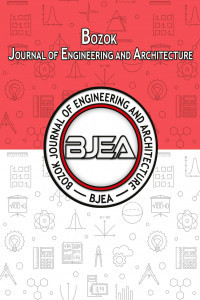Fe-%40 Ni-%2X (X=Mn, Si) Süperalaşımlarında Yapısal ve Mekanik Özelliklerin İncelenmesi
Austenite, Vickers mikrosertlik, Süper alaşım, Elastik davranış, Alaşım elementleri
Investigation of structural and mechanical properties of Fe-40%Ni-2%X (X=Mn, Si) Superalloys
Austenite, Vickers microhardness, Superalloys, Elastic behavior, Alloying elements,
___
- Referans1 A. Joarder, “Physical Metallurgy of Steels” National Metallurgical Laboratory.
- Referans2 V. Tsakiris and D.V.Edmonds, “Martensite and deformation twinning in austenitic steels”, Mater. Sci. and Eng. A273-275, (1999),430-436.
- Referans3 J.W. Elmer, S.M. Allen, and T.W. Eagar, “Microstructural Development during Solidification of Stainless Steel Alloys”, Metallurgical Transactions A, Volume 20A, (1989), 2117-2131.
- Referans4 M.J. Donachie and S.J. Donachie, “Superalloys: A Technical Guide” Secon Edition, (2002), Chapter 1.
- Referans5 Brick R.W., Pense A.W. and Gordon R.B., “Structure and Properties of Engineering Materials”, Fourth Edition.
- Referans6 A.K. Varsneya, “Fundamental of İnorganic Glasses” (1994), Chapter 8, p177.
- Referans7 H.M. Ledbetter and R.P. Reed, “Elastic Properties of Metals and Alloys”, J. Phys. Chem. Ref. Data, (1973), Vol 2, No3, 531-617.
- Referans8 W.D. Callister and D.G. Rethwisch, “Materials Science and Engineering an Introduction”, (2009), Eight Edition, 151-195.
- Başlangıç: 2022
- Yayıncı: Yozgat Bozok Üniversitesi
KENTİN MEKÂNSAL DEĞİŞİMİNDE KENTSEL SİT ALANI VE SİT ALANINDA KONUT KİRALAMA: ELBİSTAN ÖRNEĞİ
Hüsne TEMUR, Seda ÇALIŞIR HOVARDAOĞLU
Karamadazı (Yahyalı-Kayseri) Skarn Yatağının Sıvı Kapanım Çalışması
Mehmet KESKİN, Nursel ÖKSÜZ, İsmail KOÇAK
Fe-%40 Ni-%2X (X=Mn, Si) Süperalaşımlarında Yapısal ve Mekanik Özelliklerin İncelenmesi
